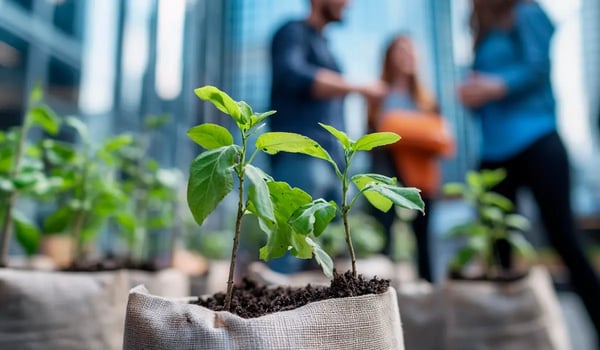The International Air Transport Association (IATA) has announced that airlines are set to invest...
South Africa Raises Carbon Offset Limits, Strengthening Domestic Market
South Africa is making key adjustments to its carbon tax, expanding the use of offsets in an effort to bolster its local carbon market. Announced as part of the national budget, the updated measures will take effect in 2026, marking the beginning of the tax’s second phase.
 A tree nursery worker carefully plants a seedling in fertile South African soil, with a lush forest behind. AI generated picture.
A tree nursery worker carefully plants a seedling in fertile South African soil, with a lush forest behind. AI generated picture.
The revised framework increases the percentage of emissions that businesses can offset. For industrial processes and fugitive emissions, the allowance rises from 5% to 10%, while combustion emissions—such as those from transport—will see an increase from 10% to 15%. While these numbers are lower than initial proposals, they represent a significant shift in the country’s carbon strategy.
One key takeaway from the announcement is that only South Africa-based carbon credits will be eligible for compliance. Despite speculation that international offsets might be included, the government reaffirmed its focus on supporting domestic project developers.
Industry experts see this policy shift as a response to the limited availability of local carbon credits. By allowing businesses to offset a greater share of their emissions, the government hopes to encourage investment in domestic projects, bringing more liquidity into the market.
TASC, a South African developer of cookstoves and nature-based carbon projects, welcomed the update, emphasising its role in providing long-term stability.
‘With greater clarity and market confidence owing to increased pricing transparency, South Africa is well-placed to attract international capital and accelerate the transition to a low-carbon economy,’ said Storm Patel, Commercial Director at TASC.
Companies subject to the tax rely on the Carbon Offset Administration System (COAS) to manage emissions liabilities, with only three certification standards currently recognised: the Clean Development Mechanism (CDM), Verra’s Verified Carbon Standard (VCS), and Gold Standard.
Leading up to the announcement, COAS carbon credit prices were assessed at $9 per tonne by Quantum on March 11. The new offset rules could drive prices higher as demand increases.
Additionally, the government confirmed that offsets from projects approved before the introduction of the tax will remain valid until December 31, 2028.
The broader tax structure remains unchanged, with levies set to rise from $10 (ZAR190) per tonne of CO₂ equivalent in 2024 to $25 (ZAR462) per tonne by 2030. According to Izak Swart, Director of Africa Tax and Legal at Deloitte, ‘These [overall levies] are certain and unlikely to change in the future.’
With these adjustments, South Africa is refining its carbon tax approach while reinforcing its commitment to a strong domestic offset market. As businesses navigate these changes, investors and sustainability leaders will be closely watching how the policy influences market activity and project development.






